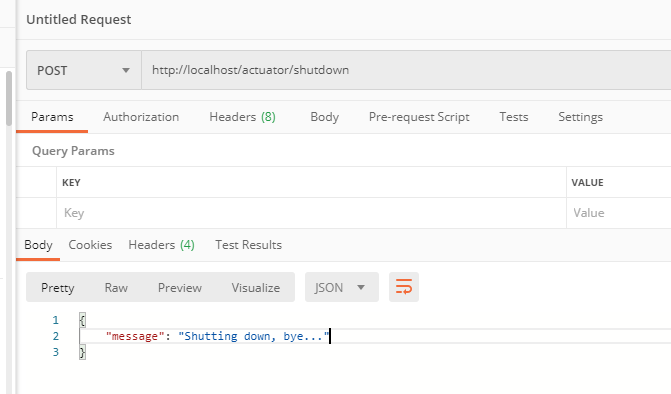在SpringBoot中整合使用Netty框架
Netty是一个非常优秀的Socket框架。如果需要在SpringBoot开发的app中,提供Socket服务,那么Netty是不错的选择。
Netty与SpringBoot的整合,我想无非就是要整合几个地方
- 让netty跟springboot生命周期保持一致,同生共死
- 让netty能用上ioc中的Bean
- 让netty能读取到全局的配置
整合Netty,提供WebSocket服务
这里演示一个案例,在SpringBoot中使用Netty提供一个Websocket服务。
servlet容器本身提供了websocket的实现,但这里用netty的实现
添加依赖
<dependency>
<groupId>io.netty</groupId>
<artifactId>netty-all</artifactId>
</dependency>
是的,不用声明版本号。因为 spring-boot-dependencies 中已经声明了最新的netty依赖。
通过yaml配置基本的属性
server:
port: 80
logging:
level:
root: DEBUG
management:
endpoints:
web:
exposure:
include: "*"
endpoint:
shutdown:
enabled: true
netty:
websocket:
# Websocket服务端口
port: 1024
# 绑定的网卡
ip: 0.0.0.0
# 消息帧最大体积
max-frame-size: 10240
# URI路径
path: /channel
App使用了,actuator,并且开启暴露了 shutdown 端点,可以让SpringBoot App优雅的停机。
在这里通过 netty.websocket.* 配置 websocket服务相关的配置。
通过 ApplicationRunner 启动Websocket服务
import java.net.InetSocketAddress;
import org.slf4j.Logger;
import org.slf4j.LoggerFactory;
import org.springframework.beans.BeansException;
import org.springframework.beans.factory.annotation.Value;
import org.springframework.boot.ApplicationArguments;
import org.springframework.boot.ApplicationRunner;
import org.springframework.context.ApplicationContext;
import org.springframework.context.ApplicationContextAware;
import org.springframework.context.ApplicationListener;
import org.springframework.context.event.ContextClosedEvent;
import org.springframework.stereotype.Component;
import io.netty.bootstrap.ServerBootstrap;
import io.netty.channel.Channel;
import io.netty.channel.ChannelFutureListener;
import io.netty.channel.ChannelHandlerContext;
import io.netty.channel.ChannelInboundHandlerAdapter;
import io.netty.channel.ChannelInitializer;
import io.netty.channel.ChannelPipeline;
import io.netty.channel.EventLoopGroup;
import io.netty.channel.nio.NioEventLoopGroup;
import io.netty.channel.socket.SocketChannel;
import io.netty.channel.socket.nio.NioServerSocketChannel;
import io.netty.handler.codec.http.DefaultFullHttpResponse;
import io.netty.handler.codec.http.FullHttpRequest;
import io.netty.handler.codec.http.HttpObjectAggregator;
import io.netty.handler.codec.http.HttpResponseStatus;
import io.netty.handler.codec.http.HttpServerCodec;
import io.netty.handler.codec.http.HttpVersion;
import io.netty.handler.codec.http.websocketx.WebSocketServerProtocolHandler;
import io.netty.handler.codec.http.websocketx.extensions.compression.WebSocketServerCompressionHandler;
import io.netty.handler.stream.ChunkedWriteHandler;
import io.springboot.netty.websocket.handler.WebsocketMessageHandler;
/**
* 初始化Netty服务
* @author Administrator
*/
@Component
public class NettyBootsrapRunner implements ApplicationRunner, ApplicationListener<ContextClosedEvent>, ApplicationContextAware {
private static final Logger LOGGER = LoggerFactory.getLogger(NettyBootsrapRunner.class);
@Value("${netty.websocket.port}")
private int port;
@Value("${netty.websocket.ip}")
private String ip;
@Value("${netty.websocket.path}")
private String path;
@Value("${netty.websocket.max-frame-size}")
private long maxFrameSize;
private ApplicationContext applicationContext;
private Channel serverChannel;
public void setApplicationContext(ApplicationContext applicationContext) throws BeansException {
this.applicationContext = applicationContext;
}
public void run(ApplicationArguments args) throws Exception {
EventLoopGroup bossGroup = new NioEventLoopGroup();
EventLoopGroup workerGroup = new NioEventLoopGroup();
try {
ServerBootstrap serverBootstrap = new ServerBootstrap();
serverBootstrap.group(bossGroup, workerGroup);
serverBootstrap.channel(NioServerSocketChannel.class);
serverBootstrap.localAddress(new InetSocketAddress(this.ip, this.port));
serverBootstrap.childHandler(new ChannelInitializer<SocketChannel>() {
@Override
protected void initChannel(SocketChannel socketChannel) throws Exception {
ChannelPipeline pipeline = socketChannel.pipeline();
pipeline.addLast(new HttpServerCodec());
pipeline.addLast(new ChunkedWriteHandler());
pipeline.addLast(new HttpObjectAggregator(65536));
pipeline.addLast(new ChannelInboundHandlerAdapter() {
@Override
public void channelRead(ChannelHandlerContext ctx, Object msg) throws Exception {
if(msg instanceof FullHttpRequest) {
FullHttpRequest fullHttpRequest = (FullHttpRequest) msg;
String uri = fullHttpRequest.uri();
if (!uri.equals(path)) {
// 访问的路径不是 websocket的端点地址,响应404
ctx.channel().writeAndFlush(new DefaultFullHttpResponse(HttpVersion.HTTP_1_1, HttpResponseStatus.NOT_FOUND))
.addListener(ChannelFutureListener.CLOSE);
return ;
}
}
super.channelRead(ctx, msg);
}
});
pipeline.addLast(new WebSocketServerCompressionHandler());
pipeline.addLast(new WebSocketServerProtocolHandler(path, null, true, maxFrameSize));
/**
* 从IOC中获取到Handler
*/
pipeline.addLast(applicationContext.getBean(WebsocketMessageHandler.class));
}
});
Channel channel = serverBootstrap.bind().sync().channel();
this.serverChannel = channel;
LOGGER.info("websocket 服务启动,ip={},port={}", this.ip, this.port);
channel.closeFuture().sync();
} finally {
bossGroup.shutdownGracefully();
workerGroup.shutdownGracefully();
}
}
public void onApplicationEvent(ContextClosedEvent event) {
if (this.serverChannel != null) {
this.serverChannel.close();
}
LOGGER.info("websocket 服务停止");
}
}
NettyBootsrapRunner 实现了 ApplicationRunner, ApplicationListener<ContextClosedEvent>, ApplicationContextAware 接口。
这样一来,NettyBootsrapRunner 可以在App的启动和关闭时执行Websocket服务的启动和关闭。而且通过 ApplicationContextAware 还能获取到 ApplicationContext
通过IOC管理 Netty 的Handler
import org.slf4j.Logger;
import org.slf4j.LoggerFactory;
import org.springframework.beans.factory.annotation.Autowired;
import org.springframework.stereotype.Component;
import io.netty.channel.ChannelHandlerContext;
import io.netty.channel.SimpleChannelInboundHandler;
import io.netty.channel.ChannelFutureListener;
import io.netty.channel.ChannelHandler.Sharable;
import io.netty.handler.codec.http.websocketx.TextWebSocketFrame;
import io.netty.handler.codec.http.websocketx.WebSocketCloseStatus;
import io.netty.handler.codec.http.websocketx.WebSocketFrame;
import io.springboot.netty.service.DiscardService;
/**
*
* @author Administrator
*
*/
@Sharable
@Component
public class WebsocketMessageHandler extends SimpleChannelInboundHandler<WebSocketFrame> {
private static final Logger LOGGER = LoggerFactory.getLogger(WebsocketMessageHandler.class);
@Autowired
DiscardService discardService;
@Override
protected void channelRead0(ChannelHandlerContext ctx, WebSocketFrame msg) throws Exception {
if (msg instanceof TextWebSocketFrame) {
TextWebSocketFrame textWebSocketFrame = (TextWebSocketFrame) msg;
// 业务层处理数据
this.discardService.discard(textWebSocketFrame.text());
// 响应客户端
ctx.channel().writeAndFlush(new TextWebSocketFrame("我收到了你的消息:" + System.currentTimeMillis()));
} else {
// 不接受文本以外的数据帧类型
ctx.channel().writeAndFlush(WebSocketCloseStatus.INVALID_MESSAGE_TYPE).addListener(ChannelFutureListener.CLOSE);
}
}
@Override
public void channelInactive(ChannelHandlerContext ctx) throws Exception {
super.channelInactive(ctx);
LOGGER.info("链接断开:{}", ctx.channel().remoteAddress());
}
@Override
public void channelActive(ChannelHandlerContext ctx) throws Exception {
super.channelActive(ctx);
LOGGER.info("链接创建:{}", ctx.channel().remoteAddress());
}
}
handler已经是一个IOC管理的Bean,可以自由的使用依赖注入等Spring带来的快捷功能。由于是单例存在,所有的链接都使用同一个hander,所以尽量不要保存任何实例变量。
这个Handler处理完毕客户端的消息后,给客户端会响应一条:"我收到了你的消息:" + System.currentTimeMillis() 的消息
为了演示在Handler中使用业务层,这里假装注入了一个 DiscardService 服务。它的逻辑很简单,就是丢弃消息
public void discard (String message) {
LOGGER.info("丢弃消息:{}", message);
}
演示
启动客户端
<!DOCTYPE html>
<html>
<head>
<meta charset="UTF-8">
<title>Websocket</title>
</head>
<body>
</body>
<script type="text/javascript">
;(function(){
const websocket = new WebSocket('ws://localhost:1024/channel');
websocket.onmessage = e => {
console.log('收到消息:', e.data);
}
websocket.onclose = e => {
let {code, reason} = e;
console.log(`链接断开:code=${code}, reason=${reason}`);
}
websocket.onopen = () => {
console.log(`链接建立...`);
websocket.send('Hello');
}
websocket.onerror = e => {
console.log('链接异常:', e);
}
})();
</script>
</html>
链接创建后就给服务端发送一条消息:Hello
关闭服务端
使用 PostMan 请求服务器的停机端点

日志
客户端日志

服务端日志
2020-06-22 17:08:22.728 INFO 9392 --- [ main] io.undertow : starting server: Undertow - 2.1.3.Final
2020-06-22 17:08:22.740 INFO 9392 --- [ main] org.xnio : XNIO version 3.8.0.Final
2020-06-22 17:08:22.752 INFO 9392 --- [ main] org.xnio.nio : XNIO NIO Implementation Version 3.8.0.Final
2020-06-22 17:08:22.839 INFO 9392 --- [ main] org.jboss.threads : JBoss Threads version 3.1.0.Final
2020-06-22 17:08:22.913 INFO 9392 --- [ main] o.s.b.w.e.undertow.UndertowWebServer : Undertow started on port(s) 80 (http)
2020-06-22 17:08:22.931 INFO 9392 --- [ main] io.springboot.netty.NettyApplication : Started NettyApplication in 4.536 seconds (JVM running for 5.175)
2020-06-22 17:08:23.653 INFO 9392 --- [ main] i.s.n.w.runner.NettyBootsrapRunner : websocket 服务启动,ip=0.0.0.0,port=1024
2020-06-22 17:08:28.484 INFO 9392 --- [ XNIO-1 task-1] io.undertow.servlet : Initializing Spring DispatcherServlet 'dispatcherServlet'
2020-06-22 17:08:28.484 INFO 9392 --- [ XNIO-1 task-1] o.s.web.servlet.DispatcherServlet : Initializing Servlet 'dispatcherServlet'
2020-06-22 17:08:28.492 INFO 9392 --- [ XNIO-1 task-1] o.s.web.servlet.DispatcherServlet : Completed initialization in 8 ms
2020-06-22 17:08:28.724 INFO 9392 --- [ntLoopGroup-3-1] i.s.n.w.handler.WebsocketMessageHandler : 链接创建:/0:0:0:0:0:0:0:1:12093
2020-06-22 17:08:28.790 INFO 9392 --- [ntLoopGroup-3-1] i.s.netty.service.DiscardService : 丢弃消息:Hello
2020-06-22 17:08:33.688 INFO 9392 --- [ Thread-232] i.s.n.w.runner.NettyBootsrapRunner : websocket 服务停止
2020-06-22 17:08:33.691 INFO 9392 --- [ntLoopGroup-3-1] i.s.n.w.handler.WebsocketMessageHandler : 链接断开:/0:0:0:0:0:0:0:1:12093
2020-06-22 17:08:33.699 INFO 9392 --- [ Thread-232] io.undertow : stopping server: Undertow - 2.1.3.Final
2020-06-22 17:08:33.704 INFO 9392 --- [ Thread-232] io.undertow.servlet : Destroying Spring FrameworkServlet 'dispatcherServlet'
2020-06-22 17:08:33.708 INFO 9392 --- [ Thread-232] o.s.s.concurrent.ThreadPoolTaskExecutor : Shutting down ExecutorService 'applicationTaskExecutor'
Netty会在SpringBoot App启动后启动,App停止后关闭,可以正常的对外提供服务
并且Handler交给IOC管理可以注入Service,完成业务处理。